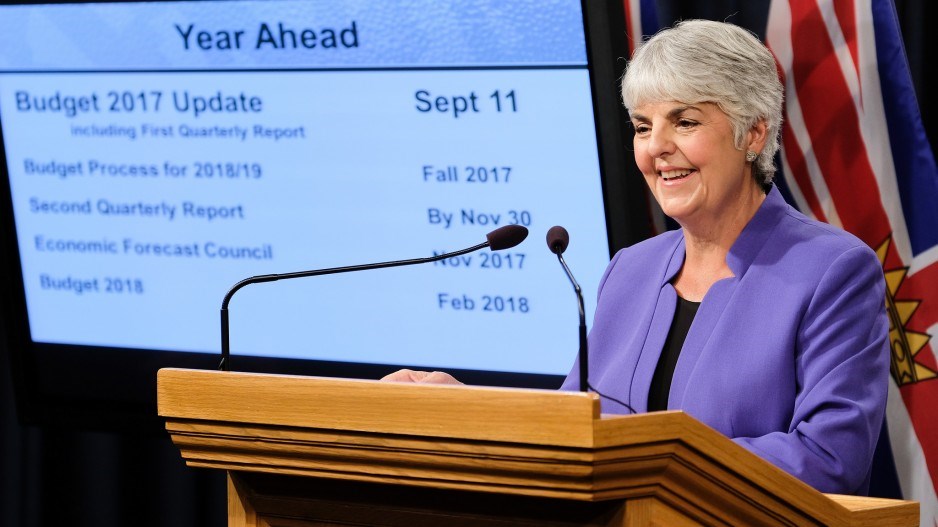The B.C. government is on track to net an additional $450 million in surplus for 2018-2019, despite falling property transfer tax revenue from a slightly moderating housing market.
In the government’s first quarterly report for the 2018-2019 budget, Finance Minister Carole James said economic indicators for B.C. are positive and that measures like a real estate speculation tax are beginning to slightly moderate Vancouver’s over-heated housing market.
While spending was $1.2 billion higher than budgeted, revenue was also higher than expected, increasing $1.6 billion. About $1 billion of that increase is from income taxes.
B.C.’s economic growth projections have been revised down slightly – to 2.2% from 2.3% in 2018, and to 1.8% from 2% in 2019. But comparatively speaking, B.C. still is expected to continue to have some of the strongest economic growth in Canada.
“B.C. continues to lead when it comes to economic growth both in 2018 and in 2019,” James said at a press conference Friday, September 7.
Retail sales tax revenue is down slightly, by $43 million, but natural resource revenue is up $495 million, thanks to strong demand and prices for B.C. lumber and metallurgical coal, although revenue from natural gas is down, thanks to low natural gas prices.
The government expects increased revenue from natural gas, should liquefied natural gas plants be built in B.C., though James said her government is not budgeting any revenue from that until there is a final investment decision from LNG Canada. Nor is the government budgeting for any windfall from legalized recreational cannabis sales just yet.
Expenditures this year are projected to be $1.2 billion higher than forecast in the current budget. Close to half of that comes from fighting wildfires – $541 million. There has also been a $380 million increased uptake in B.C. film industry tax credits.
While tax revenue is up in some areas, property transfer tax revenue is falling. That is a result of deliberate measures to curb speculation in B.C. real estate.
“You will see clear signs in this report that the housing market is beginning to moderate,” James said.
That moderation means less revenue for the provincial government. Property transfer tax revenue dropped $53 million between April and June, and is expected to be down $250 million for the current fiscal year, $300 million lower in 2019-2020, and $400 million in 2020-2021.
Housing sales have slowed, however housing starts remain strong and housing prices have not decreased significantly.
“The crisis continues,” James said. “These slight drops don’t make a difference for many families who are still struggling to be able to live where the work is.”
But James hopes to see the curbs her government has placed on real estate speculation will eventually cool the housing market.
Although that will mean less revenue, it’s overall better for the economy, James said, because housing affordability – the lack thereof – has become as serious impediment and is a top concern for employers, James said.
“If we don’t have affordable housing people will leave the province,” she said.
As for financial risks, they come mostly from Crown corporation debt – ICBC and BC Hydro – and global trade uncertainties, mostly related to the North American Free Trade Agreement and American trade tariffs.
"I think British Columbia is in a stronger position than some provinces because of the diversification of our economy, but it remains if there is a trade challenge around NAFTA, that's going to have an impact on us economically, which is why you see the prudence built in to the budget."
The prudence she referred to includes $2 billion in contingency funding and $1.45 billion in forecast allowances over three years.




